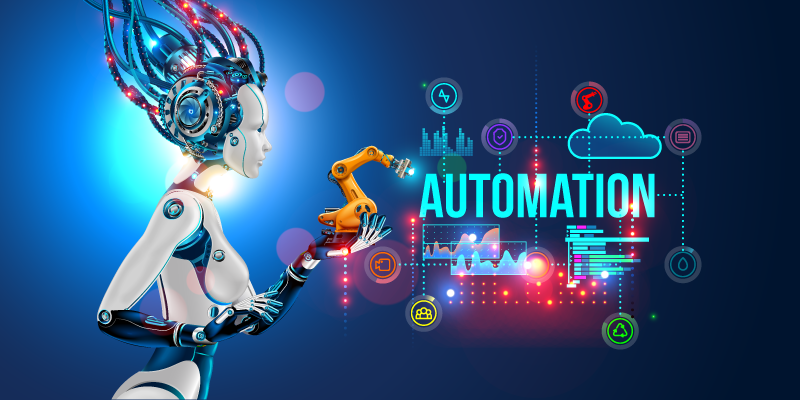How COVID-19 is set to speed up the adoption of automation technologies
In the COVID-19 environment, where contactless interaction is the top priority, automation technologies have found faster adoption than ever.
Vishal Krishna

Monday June 22, 2020 , 7 min Read
The COVID-19 pandemic has created an economic turmoil, where industries and businesses have come to a standstill. Organisations are also suffering losses due to the shortfall in productivity due to the lockdown.
In this scenario, one of the leading ecommerce players in India, which has a warehouse spread over 100,000 square feet, faced the challenge of carrying out quality checks on all the goods that were coming into the facility.
Being a very human-intensive exercise, the company had to engage with a computer vision startup to deploy its automation technologies to do the job.

At a time when there is a greater thrust on contactless environment, the demand for such automation technologies has increased manifold, with industries and companies looking at ways to ensure safety, efficiency, productivity, and also profitability.
Automation technologies have been around for some time, with their deployment at various levels like chatbots, automated tele-calling, voice assistants, or the industrialised robotic environment. But now, the trigger has come in the form of COVID-19, where there seems to be an urgency to deploy these technologies.
Indian IT industry body , in a report title “COVID-19 – Tipping for automation", says the pandemic has acted as a catalyst for the development of automation technologies.
“The global and India industry will require unprecedented and concerted attempts to recover and revive from the aftermath of the COVID-19 crisis, and in this process, it will find itself at a crucial tipping point of mass-transition towards wide-scale automation adoption,” said Nasscom President Debjani Ghosh.
While the financial services sector has been one of the early adopters of automation technologies with likes of banks, insurance companies, etc., the manufacturing and ecommerce sectors have stepped up their automation efforts. However, sectors which have lower digitisation capability are generally slower in adopting automation.
The need for automation
Milan Sheth, Executive Vice President – India, Middle East, and Africa East region, Automation Anywhere, a robotic process automation unicorn, says,
“The demand for automation technology will certainly go up.”
According to him, companies and industries are increasingly relying on automation to ensure there is continuity in operations, faster return on investment, and it has the ability to generate revenue even during these times.
Ajith Nayar, Co-founder and CMO of deeptech startup , which provides AI platform for automated quality control, says, “There is more interest in our solutions, and the number of proposals being sent by us has grown exponentially since the lockdown as enterprises are looking at how the level of human interaction can be future-proofed.”
He cites the example of car insurance, which requires onsite inspection, and hence human interaction. In this time of COVID-19, one can do it remotely by doing the inspection through the computer vision platform, thereby minimising the risk, and also generating revenue for the insurance company.
Umesh Sachdev, Co-founder of Uniphore, a conversational AI startup, says, the multifold increase in the number of calls over the last three months reveals the need for automation and AI.
“It is a rude shock for companies being forced to take this decision. There is uncertainty, but clients want AI to automate their business,” he remarks.
AI and automation
According to Accenture’s Systems Resilience POV, based on the Future Systems research survey conducted across 8,300 companies before the COVID-19 crisis, only 10 percent of the companies had cracked the code on systems resilience.
The report clearly says artificial intelligence (AI) and automation are the way forward. In the future, key markers of adaptable organisations include enterprise-wide use of automation and AI, a continuous data supply chain in the cloud to power the AI in the enterprise, and a stable but modular, flexible, and constantly evolving architecture. About 94 percent of leaders systematically track ROIs in automation across the organisation, compared to only 47 percent of laggards.
“Hyper automation will mitigate the impact of systems disruption, free up human resource capacity, and streamline IT workforce management,” says Ramnath Venkataraman, Lead, Integrated Global Services, Accenture Technology.
Typically, whenever there is a crisis, the level of interaction among humans increases, and in the current situation, there is a need for automation to handle the increased load.
According to Umesh, many BPO centres have witnessed 4X traffic, and Uniphore’s AI platform allowed them to monitor the calls using speech-to-text platform.
UiPath, a global RPA unicorn, with its R&D centre in Bengaluru, stated that as COVID-19 pandemic continues to impact business operations, organisations around the world are facing extreme challenges, including the increased need in customer support.
For example, OTP Bank Romania is using an automation solution that integrates the capabilities of both Druid chatbots and UiPath’s software robots to process requests to postpone bank loan instalments. The integration allowed the bank to cut down the processing time of a single request from 10 minutes to 20 seconds, and cope with a 125 percent increase in the number of calls received by call centre agents, enabling it to process three times more deferral requests with the same number of people in the back office.
Widespread deployment
Automation has also stepped into the area of human resource management (HRM) in a major way.
, the talent intelligence platform, is able to match individuals and opportunities based on their potential to succeed in a role, rather than look at their past success through its AI platform.
Ashutosh Garg, Founder of Eightfold, says: “Let us say, an oil company wants to move towards alternative energy. It can get a visual representation of what skills its workforce has and see where the is a gap. It can even compare its skills to competitors’ skills. This platform can be very valuable to a company wanting to transform itself and get the talent it needs,”
This, in turn, increases efficiency, reduces the time taken for the entire process, and also results in cost savings.
There is also the deployment of AI and automation in an area like agriculture. Plantix, an agritech startup founded by Rob Strey and Simone Strey, which has its base in Hyderabad and Berlin, leverages AI and automation to help farmers.
The company uses AI to identify plant diseases, pests, and nutrient deficiencies. The only thing the farmer needs to do is click an image of the crop with the app installed on the smartphone and the software identifies the problem. Plantix then gives recommendations to find the right product, which helps fight the disease. The app also gives disease alert to farmers.
“As many as 1.2 million farmers use the app at least once per month,” says Simone.
The jury is still out on what will be the impact on jobs with the onset of automation. It is expected that there would be some loss of jobs, but it is unlikely to be large scale as automation technologies is still in its early days.
Beyond efficiency
Today, automation is not just about ensuring efficiency or cutting down the costs, but it can be a key enabler for revenue generation.
EY, in a recent report “Is contactless sales the new reality for industrial products?”, states, “While the physical sales process is becoming remote, sales pitch, smart communication, stories, and personal experiences will remain crucial going forward. Today, businesses have shown digital adoption by utilising several automation tools and techniques to acquire leads. However, an end-to-end seamless operation across the entire sales process still seems to be amiss.”
The pace of automation is certainly going to increase in the days to come, and the adoption level among companies and sector can vary.
Milan of Automation Anywhere says, “The progressive ones in the automation strategy are those companies which are digital-ready and the same cannot be said of those who have not digitised enough.”
Automation can also bring other benefits, which a normal human being in a repetitive task might find it a strain. “There is a significant increase in the adoption of automation technologies as it removes subjectivity and makes it contactless. These automation platforms have the ability to continuously learn, which makes it much more superior,” says Ajith of Camcom.
Edited by Megha Reddy












